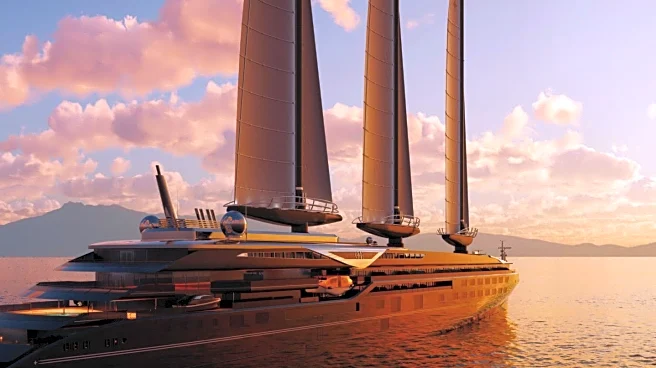What's Happening?
Gabe Newell, co-founder of Valve, has taken delivery of a new superyacht named Leviathan, valued at $500 million. The yacht, built by Oceanco, is designed to operate with no emissions for extended periods, thanks to its diesel-electric power plant and
battery storage system. Leviathan features a submarine garage, an on-board hospital, and 15 gaming PCs, among other amenities. The vessel is intended to support both hospitality and scientific research, reflecting Newell's interests in neural interfaces and marine research. Over 2,000 people contributed to the yacht's creation, with their names engraved on a glass panel in the main staircase.
Why It's Important?
The unveiling of Leviathan highlights the intersection of luxury and sustainability in the maritime industry. By incorporating advanced technology to minimize emissions, the yacht sets a precedent for eco-friendly design in high-end vessels. This development may influence future yacht designs, encouraging more sustainable practices in the industry. Additionally, Newell's investment in scientific research capabilities aboard the yacht underscores the growing trend of integrating research facilities into private vessels, potentially advancing marine and neural interface studies.
What's Next?
Leviathan is expected to serve as a platform for both leisure and scientific endeavors, potentially leading to new collaborations in marine research and technology development. The yacht's unique design and capabilities may inspire other wealthy individuals to invest in similar projects, promoting innovation in sustainable maritime technology. As Newell continues to work on 'super-awesome' projects, Leviathan may play a role in facilitating these initiatives, particularly in the fields of neuroscience and marine exploration.
Beyond the Headlines
The creation of Leviathan reflects broader trends in the luxury industry, where sustainability and technological innovation are becoming increasingly important. The yacht's design challenges traditional maritime practices, opting for composite materials over traditional ones to reduce maintenance. This shift could influence the broader maritime industry, encouraging the adoption of more sustainable materials and practices. Furthermore, the integration of scientific research facilities aboard private vessels may lead to new discoveries and advancements in marine science.


















